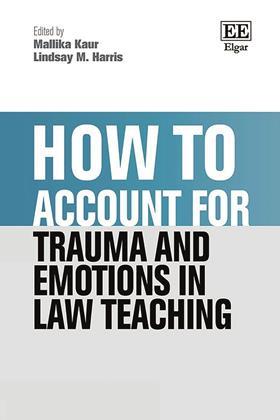How to Account for Trauma and Emotions in Law Teaching
Edited by Mallika Kaur and Lindsay M. Harris
£90, Edward Elgar
★★✩✩✩
Law, generally, has little space for emotion. It tends to be dispassionate, treating every situation as a problem to be solved. But law also involves humans. Every case has a human story, sometimes comic, often tragic, always human.
This collection of essays discusses ways in which emotion and trauma may be considered in law. Some are obvious. How traumas suffered by victims of crime or accidents may influence how a lawyer should manage their case to maximise the client’s ability to participate and minimise further trauma as their story is picked over. Others are less clear. The secondary trauma of students faced with emotive case studies. It is these latter cases where I became somewhat lost.
One can understand a student who has suffered a traumatic event themselves experiencing emotional impact – a sexual assault victim reacting to a seminar case study involving rape, for example. But one must ask whether obsessively focusing on secondary trauma is counterproductive, creating an expectation that students will experience trauma.

Some chapters are excellent. Deeya Haldar’s chapter on trauma and emotion in representing domestic violence victims made me think about ways in which I supported – or failed to support – such clients earlier in my career. Andrew Bradt’s conversational and relationship-building interpretation of the Socratic method in teaching has much to recommend.
However, my main criticism is captured in the introductory chapter. Discussing ‘trauma-centred strategies’ in the classroom, Mallika Kaur states that she ‘strives to incorporate physical movement, tactile activities – colourful sticky notes… Play-Doh/putty art, and quick stretching “games”’. This is legal pedagogy reduced to the level of the nursery. The infantilisation of the profession. When Shakespeare’s Dick the Butcher announced he would ‘kill all the lawyers’, he meant that in Dick’s fantasy, his regime would remove anyone able to stand up for the rule of law. One of the surest defences against oppression and tyranny is a fearless and independent legal profession.
I fear that if Kaur and Harris’ vision of legal education were realised, a future dictator would not need to kill all the lawyers. He would just have to preface his nefarious schemes with trigger warnings.
James E Hurford is a solicitor at the Government Legal Department, London































No comments yet